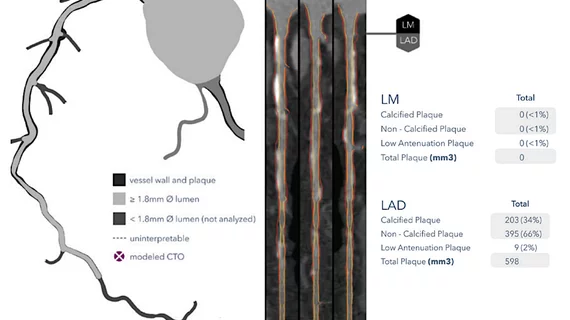Updated HeartFlow technology offers interactive features, full integration with FFR-CT
HeartFlow introduced the world to the latest version of its artificial intelligence-powered Plaque Analysis platform Thursday, July 18, at the Society of Cardiovascular Computed Tomography (SCCT) 2024 Annual Scientific Meeting in Washington, D.C.
The upgraded platform is the only plaque analysis tool fully integrated with FFR-CT. According to HeartFlow, it can deliver enhanced clinical decision-making and enable personalized patient treatment plans. The Plaque Analysis algorithms analyze coronary computed tomography angiogram (CCTA) scans, creating a personalized 3D model that quantifies and characterizes plaque volume in the coronary arteries.
“Having access to a patient’s whole coronary picture, with both quantified plaque and physiology, is a game changer as a clinician. I can reference the cross-sectional views with plaque by type when reviewing my patient’s workup and have confidence in the accuracy and actionable insights that I know I’ll get from HeartFlow Plaque Analysis,” Sarah Rinehart, MD, medical director of CV imaging, nuclear and CT at Charleston Area Medical Center, said in a statement. “With a quantitative measurement of a patient's plaque volume, I can more accurately assess risk and develop a personalized, targeted treatment plan.”
When FFR-CT is performed, a new interactive experience integrates accurate plaque quantification with lesion-specific FFR-CT values. It shows a 3D plaque model and analysis by territory across calcified, non-calcified and low-attenuation plaques. This includes viewing cross-sectional, color-coded images of each plaque type where it was quantified along the vessel.
HeartFlow said this adds more diagnostic information about a patient’s plaque burden to enable personalized treatment. In fact, the company said Plaque Analysis is the only non-invasive plaque assessment tool with 95% agreement for total plaque volume measures vs. the gold standard of intravascular ultrasound (IVUS).[1] In addition, two out of three patients had their medical management changed as a result of their care team referring with HeartFlow's advanced technology, according to a study published in JSCAI.[2]
“Accurately diagnosing a patient’s risk for coronary artery disease is critical for determining the best treatment. Our new interactive plaque experience marks an exciting era in AI-enabled cardiac technology, where we are now the only company that offers a fully integrated view of a patient’s true burden of coronary artery disease,” Campbell Rogers, MD, HeartFlow's chief medical officer, said in the same statement. “The elevated visualization of Plaque Analysis integrated with our flagship FFR-CT Analysis, sets HeartFlow apart as a wholistic solution for CT analysis, enabling physicians to enhance personalized treatment decisions.”
Steps toward Medicare coverage of AI plaque analysis
In June, five Medicare administrative contractors (MACs), CGS, NGS, Noridian, Palmetto GBA, and WPS, released draft local coverage determinations (LCD) for artificial intelligence-enabled CT-based quantitative coronary topography (AI-QCT)/coronary plaque analysis (AI-CPA). These draft LCDs recognize the importance of quantifying coronary artery plaque. HeartFlow said this is a key Medicare policy development, which should pave the way for future expanded Medicare patient access to their Plaque Analysis technology.
Read more in the article AI-based coronary plaque assessments 1 step closer to Medicare coverage.

